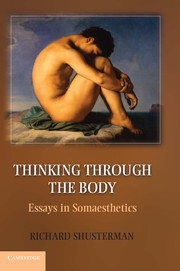Book contents
- Frontmatter
- Contents
- Preface
- Introduction
- Part I Somatic Being, Knowing, and Teaching
- 1 Thinking through the Body
- 2 The Body as Background
- 3 Self-Knowledge and Its Discontents
- 4 Muscle Memory and the Somaesthetic Pathologies of Everyday Life
- 5 Somaesthetics in the Philosophy Classroom
- Part II Somaesthetics, Aesthetics, and Culture
- Part III The Arts and the Art of Living
- Select Bibliography
- Index
- References
3 - Self-Knowledge and Its Discontents
From Socrates to Somaesthetics
Published online by Cambridge University Press: 05 November 2012
- Frontmatter
- Contents
- Preface
- Introduction
- Part I Somatic Being, Knowing, and Teaching
- 1 Thinking through the Body
- 2 The Body as Background
- 3 Self-Knowledge and Its Discontents
- 4 Muscle Memory and the Somaesthetic Pathologies of Everyday Life
- 5 Somaesthetics in the Philosophy Classroom
- Part II Somaesthetics, Aesthetics, and Culture
- Part III The Arts and the Art of Living
- Select Bibliography
- Index
- References
Summary
I
On Apollo's ancient temple at Dephi, three Greek maxims were inscribed whose importance was reaffirmed in Roman times, by preserving their inscription in gilt letters. The most famous of these maxims – Γνώθι σεατόν (Gnothi seauton or “Know thyself”) – has been, by far, the most philosophically influential and forms the focus of this chapter, though my argument will ultimately converge with a second of these maxims that is also rich in historical significance. Heraclitus gave the injunction to self-knowledge its earliest enduring philosophical application when he affirmed, “I dived into myself” because “All men have the capacity to come to know themselves and to have self-control” (the Greek term is sophronein, sometimes translated as “temperance”). The next known Greek usage of the maxim is more artistic yet less cryptic. In his play Prometheus, Aeschylus gives self-knowledge its crucial meaning of knowing one's level or limitations. When the punished but still proudly defiant Prometheus is approached by the titan god Oceanus, who offers to help him effect a reconciliation with Zeus, Oceanus urges: “Know thyself: change thy course” because Zeus now rules “o'er the Gods.”
Socrates, however, is the ancient thinker most strongly associated with the maxim of self-knowledge and the one who established it at the core of philosophy. Acclaimed as the wisest of all men by the Delphic oracle of Apollo (the God of Truth), Socrates argued that his main wisdom was the self-knowledge of his ignorance. In contrast to the many recognized experts who wrongly believed themselves full of wisdom concerning things they did not really know, Socrates at least knew himself well enough to know he did not know what others claimed to know; his wisdom was appreciating the limits of his knowledge. Indeed, he argues that the oracle declared him the wisest so as to prompt his critical search for wiser men and thus show that the most reputed “human wisdom is worth little or nothing” (Apology, 23b).
Information
- Type
- Chapter
- Information
- Thinking through the BodyEssays in Somaesthetics, pp. 68 - 90Publisher: Cambridge University PressPrint publication year: 2012
